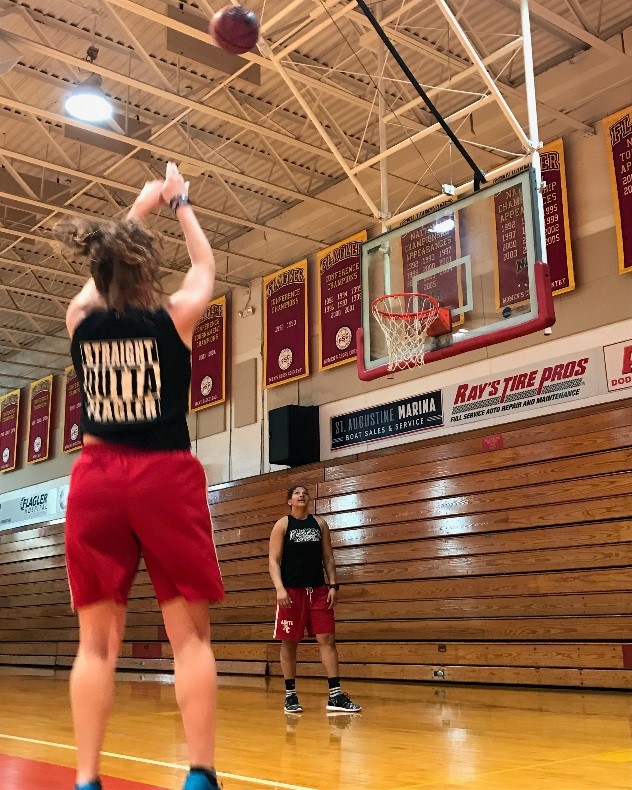By MC Bell | gargoyle@flagler.edu
Mental health counselor Kathy Payne says that the stress prevalent in the lives of student-athletes at Flagler College is not just about worry and fear, but often rooted in a lack of time management.

Women’s basketball player, Mandi Koski, practices with the team twice a week. Like many student-athletes, she balances morning workouts, practice and academics throughout the school year.
“Typically, worry and fear are future focused,” Payne said. “It is not generally worry or fear about something that is right now. It’s something that hasn’t happened yet.”
For a lot of athletes it comes down to something as simple as how they organize their day-to-day life.
“I think playing athletics at the collegiate level is a full-time job and so is carrying five classes academically. It’s like having two full-time jobs,” Payne said. “If you think about it in the real world, it would be like working two 40 hour-a-week jobs and how would you do that without feeling stressed?”
She said there is also stress that comes with the student-athlete’s sport; especially in the transition from high school to college.
“It is hard to get used to the idea that you are one on a team of high school stars and everybody is great,” Payne said. “I think it can make people feel insecure about their abilities and the students that stick with it are the ones that push through the mental stuff and keep working hard.”
Director of sports performance, Matthew Richards, said the stress that student-athletes undergo comes from different areas of a student athlete’s life.
“It’s a culmination of things,” Richards said. “Stress could be coming from family or home life, relationships or participation with their sport.”
Richards said stress can also come from the student-athlete’s relationship with the coach, performance and position on the team.
 Flagler softball player Megan Miller said time management causes her the most stress while participating in her sport and attending five classes. Most games during the season last all weekend.
Flagler softball player Megan Miller said time management causes her the most stress while participating in her sport and attending five classes. Most games during the season last all weekend.
“Every time we play, it’s a double header, so two back to back games,” Miller said. “If we play at 12 and two, we have to be there at 10 and won’t leave till four.”
She said even though the lifestyle is stressful, it is feasible. With time management, sports can be a stress reliever.
“When I’m on the field I’m not thinking, ‘I have two tests next week and three projects,’” Miller said. “It just takes my mind off things.”
For student-athletes struggling with stress, Richards said it helps to put life into focus and keep their lifestyle separate from their identity. He said communication is also important when dealing with stress. Without an outlet, it will build up.
“Life happens. It’s less about what you can control, but more so how we respond to those stressors,” Richards said “It’s about being in a good mental state and staying positive through all things.”
Payne said the student needs to buy into time management and believe that it can make a difference. Resources on campus, like help from professors, the Learning Resource Center and tutors can help student-athletes with time management.
Payne said the most important part of time management is having the drive to organize your schedule.
“The organizing is setting up your planner, allowing time for self-care and fun time like social distraction,” Payne said.
And if all these parts of your life are working together, Payne said student-athletes will be successful.



Be the first to comment on "Stress on student-athletes not all about being on the court"